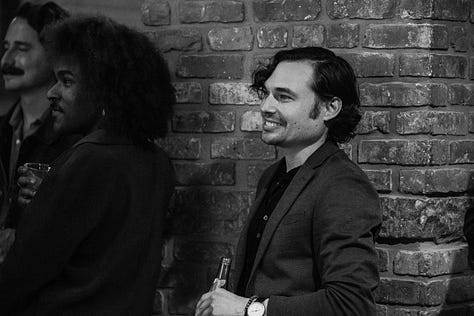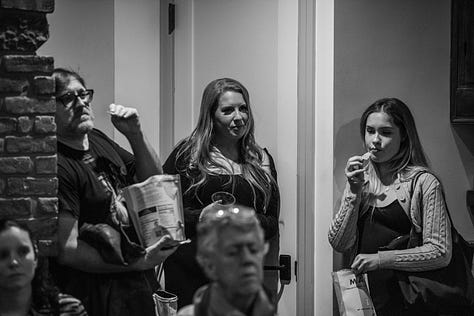Cracks in Postmodernity
You are not crazy, your eyes are not lying, and the emperor has no clothes. The dam of postmodernity is cracked.
Josef Luciano is a writer who lives in New York City. You can find him at josefluciano.com and subscribe to Cracks in Postmodernity here.
Thursdays are my thing. I was born on a Thursday, was engaged on a Thursday, and will probably die on a Thursday. Most of us work for the weekend, but I go up on Thursdays. While I enjoyed the Friday party for Cracks in Postmodernity’s first “zine” reading this summer, I felt out of place.
Cracks in PoMo (short for Cracks in Postmodernity) is a podcasting and writing platform that features thinkers and artists on all ends of the postliberal spectrum: integralists to Christian democrats, “trad Caths” to curious agnostics, and rural dads to New York scenesters. I have followed the platform for some time, which a friend originally had told me to do so as a hate-follow. “Each post has something to piss off everyone,” he remarked. That recommendation still confuses me.
Cracks in PoMo aims to interrogate those areas of postmodern thought and culture where “cracks” are apparent, seeking an answer an ever-important question: What is the proper way to embrace the potentiality of a new zeitgeist?
As a writer, I know people hate to read, especially when it comes to things with which they disagree. What I love so much about Cracks in PoMo, and what my friend clearly hated, was how each thread was deliberately nuanced, thoughtful, and hard to pin down. Click-bait and doom-scrolling rules the day, yet this account cut through the resonance of our echo chambers and challenged us to think differently.
Hence, why that hot mid-summer Friday evening was so weird for me. I only knew a few people there, and I felt like I did not belong at a celebration of something I had observed from afar. Plus, the folks at the Catholic Worker Mary House (who hosted the event) devote each day to Christ and engage with the needy in a natural, pragmatic, and profoundly concrete, human way. I felt detached.
For whatever reason, I decided I needed to give this event another chance. When I arrived at “Sovereign House” for another reading party this fall, this time on a Thursday, I immediately realized the crowd was different. It was a hodgepodge of New York bohemians: artists, writers, politicos, art historians, and internet trolls. Some were Catholic. Some were not. Most were cigarette smokers. All were world-weary. I fit right in this time around.
Things quickly thawed after the first reader was introduced. An anonymous man in a Mexican wrestler mask arrived on stage to do a dramatic reading. At one point, the Mexican wrestler choked up: “the collapse of modernism makes it difficult for us to find a way out of the neoliberal Western paradigm that, while celebrating diversity and freedom on the surface, leaves us atomized, enslaved, and confused.” What was so poignant about the absurdity was how those words perfectly summarized the crowd around me. We are all wrestling with how to interact with the world around us. Should we conform to genteel good manners? Predictability? How do we overcome social isolation and contemplate eternal beauty, lest we eschew it?
At the end of the piece, Dorothy Day, the activist and anarchist, was mentioned as one of the greatest ever to crack postmodernity. As the gravely voiced Mexican wrestler recited those words, I recalled how she spoke about the “revolution of the heart.” It starts with each one of us — and while she was far from a postliberal, maybe there is something to be learned from her. Without heart, we become angry automatons for the benefit of our neoliberal overlords on the left and right.
Next up was a man who read his piece “On the ‘Fukú,’” which was tailor-made for public speaking. Put simply, fukú is a term for a curse, and the piece was a reflection on growing up gay in a Mexican and Catholic household. As Amaro recited, “Today many of us prefer to put ourselves at the center. That’s why the world is ending.”
The third speaker read his work “Where Did All the Ties Go?” which fit nicely as both an indictment and a lamentation of the lack of formal attire in most public spaces today. After seeing La Bohème at the Metropolitan Opera, Nick left the night crestfallen, disappointed by rows of sneakers, t-shirts, denim jeans, presumably crocs somewhere, and a total lack of ties.
Throughout the piece, the speaker questioned whether he feels this way from wearing the Dead Poet Society uniform throughout Catholic School or because of his grandmother’s deep love and reverence for Puccini. “The Opera isn’t meant for us,” that is, our bland American, liberal culture. Opera is absurd, he reasons, and requires a both separation, but great reverence for reality. Characters fall in love and die two seconds later, all while singing vibrato.



Furthermore, opera aspires to something divine, something metaphysical we cannot fully understand on Earth, but it is something greater than us. As he finished reading his piece, my appreciation for the reading party grew. So, too, did the crowd, which had ballooned significantly to standing room only.
Finally, Cracks in PoMo brainchild and founder, Stephen Adubato, took the stage. “I took a risk and wrote a story. I don’t really do fiction. I was inspired by some people who told me the zine was problematic,” he said. Shouts of boos and nays erupted, which he promptly cosigned. “So I decided to make lemonade out of lemons, and wrote a story called ‘Problematic.’” Since grad school, I have hated that term. To me, problematic is typically said only when someone hears something they do not like. It is a weasel word that means nothing.
The story was a three-way conversation between an overly-earnest liberal, a nerdy yet deeply genuine trad Catholic, and a snarkily provocative anti-Western Muslim. The latter two try to engage the former with her bourgeois logic, honestly, and sincerely, which goes as well as one might expect. It tackled everything: ad hominem attacks, Catholic distributism, and Islamic sensibilities regarding Western decadence. In the end, one surprising commonality remained between the three: “Nothing matters, except for God.”
The final applause erupted. The community celebrated outside, Miller High Life’s, Hestia cigarettes, and chips in hand. When I first read the zine, I had not realized how many of the readings grapple with the idea that you are not alone — politically, aesthetically, emotionally, or spiritually. Instead of seeking to change the world, change your heart. You are not crazy, your eyes are not lying, and the emperor has no clothes. The dam is cracked. What will fill the void is to be determined.
If you enjoyed this article, please consider becoming a patron of our publication! Your enthusiasm and support means a lot to all of us at The American Postliberal — and we promise we’ll work hard for your investment in our project.


